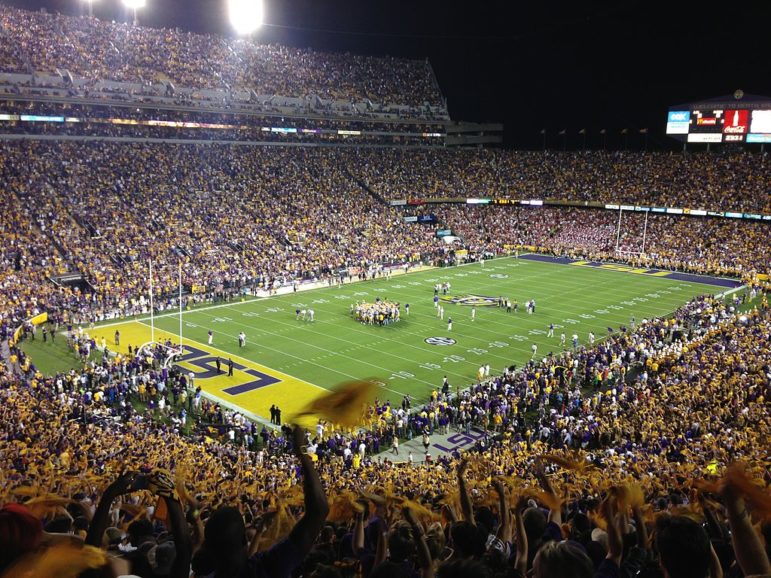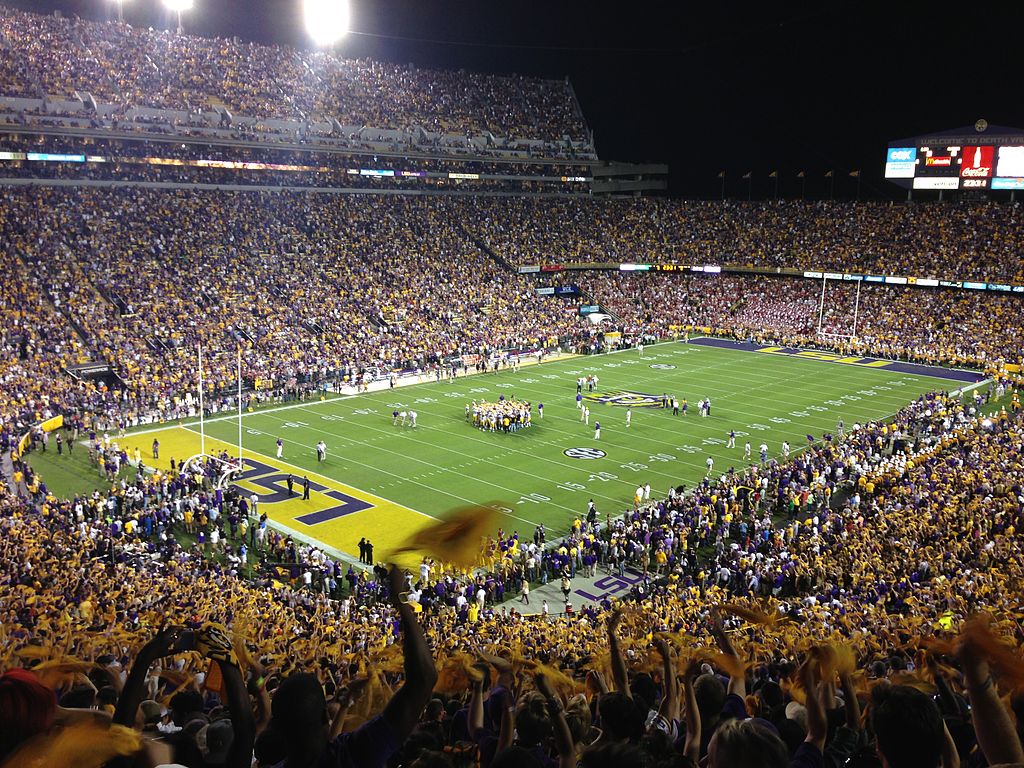
Commons
.
Judges in Louisiana have levied longer punishments for juvenile defendants unlucky enough to appear on trial the week after Louisiana State University (LSU) loses a football game in an upset, a new study finds. And defendants who are black have shouldered the brunt of this football mania bias.
“Emotional Judges and Unlucky Juveniles” concludes that some judges who received bachelor’s degrees from LSU have an emotional connection to the football team that affects how severely they sentence juvenile defendants the week after the Tigers lost a game it was expected to win.
“This study has wide-ranging implications on the juvenile justice system, especially giving hard evidence in support of why every system should adopt objective detention decision instruments at the front door, and risk and needs instruments at disposition hearings,” said Steven Teske, chief juvenile court judge of the Clayton Judicial Circuit in Georgia.
When LSU lost an upset game, incarceration and probation sentencing lengths increased about 35 days per juvenile defendant who appeared in court the following workweek, regardless of the type of offense the juvenile was accused of. These findings were based on 8,228 unique juvenile cases presided over by 207 Louisiana judges from 1996-2012.
The more important the game lost, the longer the punishments. If LSU happened to be in the Associated Press’ Top 10 rankings, a loss resulted in sentences of an additional 63 days, on average. This had a major effect on overall sentencing, because the team was in the Top 10 in 48 percent of its Saturday games.
Defendants had no way to avoid the high-risk workweeks after big games. A computer randomly sets the court schedule.
LSU economics professor Ozkan Eren, who wrote the study with fellow LSU professor Naci Mocan, said he was inspired to study this issue by the strong ties LSU fans and surrounding communities have to the football team.
“Devotion to LSU football is deeply ingrained into the culture of the state,” he said. “As such, weddings are scheduled based on LSU games, convention halls and similar organizations are besieged by phone calls the moment the LSU schedule for the following football season is finalized, and charitable organizations have their fundraising events scheduled on the nongame weeks.”
Plus, Eren has “always believed in the fact that emotions in one domain can potentially influence emotions, judgments and decisions in a completely unrelated domain.” When a person’s perception of well-being is diminished, they spend more time focusing on negatives in others, which can intensify into moral condemnation, the study said.
For more examples of Racial-Ethnic Fairness, go to JJIE Resource Hub | Racial-Ethnic Fairness: The Impact of Implicit Racial Bias on the Exercise of Prosecutorial Discretion
But there are some things avid football fandom can’t account for. When a black defendant appeared in court the week after an LSU upset, punishments increased 46 days. When it was a white defendant, only eight days.
Judges were not deliberately handing down harsher punishments, the study said, because the bias was triggered by “emotional shock.” They did find evidence that black defendants “bear much of the burden of judges’ wrath due to this emotional shock, which hints at a negative predisposition towards black defendants.”
“Judges are not immune to emotions, whether happy, sad, scared or whatever,” Teske said. “No training in law school gives us emotional immunity, but unfortunately it can create in us the self-perception that we are immune. We are trained in a skill that requires us to be objective, think on our feet and reason with logic; all those things that Spock on ‘Star Trek’ did well.
I am sure none of these judges were aware that LSU losing a game would affect their decisions that week in court. If it can happen with a football game, imagine the implications of implicit bias in our decisions? Or better yet, especially white judges, the implication of ‘white privilege’ in decision making?”
Professor Andy Billings at the University of Alabama's College of Communication and Information Sciences said football works its way into the personal lives of fans throughout the Southeastern Conference. This is especially true in states without professional football teams. There, fans place all of their hopes and enthusiasm on their college team's weekly game, in a sport where a major upset could decide the outcome of an entire season.
"It’s football culture combined with emergency," Billings said. "Because of that, you live and die on every weekend. You have people that can’t show up to church the next day or can’t show up for schools two days later, because they are still recovering from a loss."
Billings said SEC fans build their identities around their favorite team, so when that team loses, the fan also feels defeated. It is common for people to look for something else to out their frustrations on.
"You want to have something to blame that doesn’t hinder your own identity," Billings said. "The most common trope we have is blaming the officials ... but there are other ways of mitigating that, as well."
Billings said he thinks these personal connections to football teams are becoming stronger in the SEC, as the football coaches' salaries increase into the multi-millions. The more money people spend, the more invested they feel in the team's performance.
"It is a core part of who you are," Billings said. "You choose a camp, you stick with it, and it’s part of your DNA. You will see people whose household income is $30,000 or less, but do they have season tickets for Alabama, yes. Any disposable income many people have is being directly invested in the football team. Especially in Alabama, they want to be connected to a successful football program. SEC football has always been big, but never have we poured this amount of resources [in to] college football as we have at this state in time."
Teske and Rachel Gassert, policy director at the Louisiana Center for Children’s Rights, agreed that the study shows why a more involved, regulated oversight system is necessary to ensure juvenile defendants are not being unfairly punished.
“We see the effects of bias — especially unconscious bias — in many aspects of the juvenile justice system,” Gassert said. “That’s why it’s essential that we create fair and objective processes and establish sufficient checks and balances, including training and robust funding for juvenile public defense.”

Yes, of course there is the dominant factor of race evidenced here. There couldn’t possibly be anyone surprised (yawn). Being born black is undoubtedly a strike in every aspect of living, according to society. Additionally, being a black defendant will guarantee judicial unfairness reigns horridly in the court of law. The title should read “LSU-fan Judges Increase Sentences FOR BLACKS When Tigers Lose.”